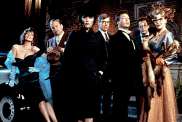Cast:
Rhys Ifans as Edward de Vere, the Earl of Oxford
Vanessa Redgrave as Queen Elizabeth I
Sebastian Armesto as Ben Jonson
Rafe Spall as William Shakespeare
David Thewlis as William Cecil
Edward Hogg as Robert Cecil
Xavier Samuel as Earl of Southampton
Sam Reid as Earl of Essex
Jamie Campbell Bower as Young Earl of Oxford
Joely Richardson as Young Queen Elizabeth I
Paolo De Vita as Francesco
Trystan Gravelle as Christopher Marlowe
Robert Emms as Thomas Dekker
Tony Way as Thomas Nashe
Julian Bleach as Captain Richard Pole
Derek Jacobi as Prologue
Alex Hassell as Spencer
James Garnon as Heminge
Mark Rylance as Condell
Jasper Britton as Pope
Michael Brown as Sly
Ned Dennehy as Interrogator
John Keogh as Philip Henslowe
Lloyd Hutchinson as Richard Burbage
Vicky Krieps as Bessie Vavasour
Helen Baxendale as Anne De Vere
Luke Thomas Taylor as Boy Earl of Oxford (as Luke Taylor)
Isaiah Michalski as Boy Robert Cecil
Timo Huber as Boy Earl of Southampton
Richard Durdan as Archbishop
James Clyde as King James I
Directed by Roland Emmerich
Story:
The world of theater and politics collide when the Earl of Oxford, Edward de Vere (Rhys Ifans) decides he wants to have some of the plays he’s written for the court performed for the masses, so he leaks his work to playwright Ben Jonson (Sebastian Armesto) to have them performed as if they were his. Not wanting to take credit, Jonson passes them onto an actor named William Shakespeare (Rafe Spall) who puts his own name on them when the plays prove to be popular. Meanwhile, de Vere is trying to raise a rebellion against the Cecils (David Thewlis, Edward Hogg), the corrupt advisors to the aging Queen Elizabeth I (Vanessa Redgrave) who forty years earlier had an affair with de Vere, which got him banned from court.
Analysis:
By now, you’ve probably heard about and possibly even scoffed at the idea of Roland Emmerich, the man behind some of the biggest on-screen destruction, natural or otherwise, since Irwin Allen, tackling the legend of William Shakespeare and the theories he never actually wrote the plays for which he’s been credited for hundreds of years. Rest assured that “Anonymous” is a bonafide game changer for the filmmaker, one that returns him to the historic drama territory of “The Patriot” and proves he’s just as comfortable in that setting.
We open on an ordinary Broadway stage where Sir Derek Jacobi introduces us to the idea of someone else having written Shakespeare’s works by using a clever framing device that transports us back to Elizabethan era England and thrusts us into the world around Shakespeare.
As much as one might think this is a movie about Shakespeare and his plays, it’s just as much about political conspiracy behind those vying for the throne once Queen Elizabeth (Vanessa Redgraves) passes away. It centers around the Earl of Oxford Edward de Vere (Rhys Ifans), who has been banished from the court for reasons we will learn later. De Vere spends much of his time writing poetries and plays, much to the disapproval of the Queen’s advisors, but realizing how big an audience he could have if his work was performed at a local theater, he hires playwright Ben Jonson to act as his envoy understanding that the true playwright’s identity remain secret. When William Shakespeare does Jonson a favor and lays claim to the work, the two men end up going on two divergent paths, Shakespeare onto fame and fortune and Jonson to being blackballed from the Globe Theater.
Although “Anonymous” purports to be based on facts, it’s clearly a work of historical fiction on par with the various “Elizabeth” movies, but at all times, Shakespeare is more of a secondary character to the story about De Vere and his relationship with the Royal Court. It might take some adjusting to how the story jumps back and forth in time to show how decades earlier, De Vere arrived at court after the death of his parents and had a torrid affair with the significantly older Elizabeth (played in flashback by Redgrave’s own kin Joely Richardson) after wooing her with his words.
Based on an exceedingly well-developed script, much of the story revolves around the connection between art and politics, showing them to essentially be one and the same, as we watch the events that influence De Vere’s writing, particularly his conflict with Elizabeth’s closest advisor, William Cecil (played by David Thewlis in both eras) and his hunchbacked son, both of whom are opposed to poetry and literature.
De Vere is a terrific role for Rhys Ifans, giving him a chance to do something serious and dramatic that shows his chops as an actor and not relying on his quirkiness. His younger counterpart Jamie Campbell Bower isn’t quite as good, although the difference between them shows the stark contrast between De Vere later in life. Many great actresses have played Elizabeth I, and you can’t get a better combo to play the older and young version than Vanessa Redgrave and her daughter Joely Richardson. The latter is quite good but she’s overshadowed by her mother’s portrayal of the doddering old monarch who seems to be incurably senile even if we do get to see her characteristic fire let loose once or twice. Playing Shakespeare himself is Rafe Spall, delivering a delightfully bombastic performance as the drunken glory hound, but the film’s weakest links is probably Sebastian Armesto as Jonson, whom for whatever reason, puts on a deep voice to try to make his words come off as more serious.
There’s an undercurrent through the film that reminds us of previous historic costume dramas, but it’s always bolstered by the grand spectacle Emmerich brings to the table as he uses his FX team to create absolutely fantastic environments. At the same time, Emmerich shows a subtlety and restraint that’s never been his forte and for the first time in his career, at least since arriving in Hollywood, the acting and writing in the movie manage to stand up to the visuals.
It’s hard to tell whether Shakespeare enthusiasts will appreciate this semi-fictionalized version of history or where the story takes it, but if nothing else, they should appreciate how the film shows the staging of Shakespeare’s early works and how his words move the common people who watch them.
The film probably could have ended a little earlier rather than tacking on so many epilogues, and the second act tends to drag, but the results are a rich and thought-provoking story filled with complex relationships as all the pieces come together for an unforgettable climax in the third act.
The Bottom Line:
Only the filmmakers and scholars know how much of “Anonymous” is based on reality and how much is artistic license, but it’s a glorious revelation of a film that could very well be considered Roland Emmerich’s “Moulin Rouge!”










